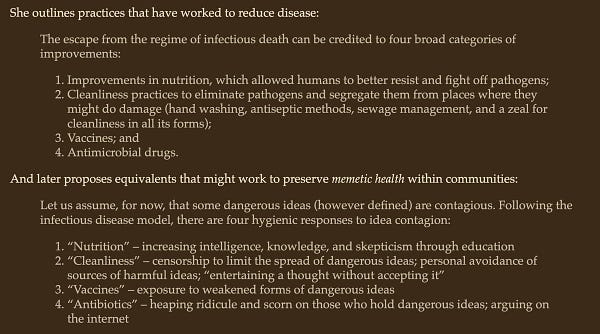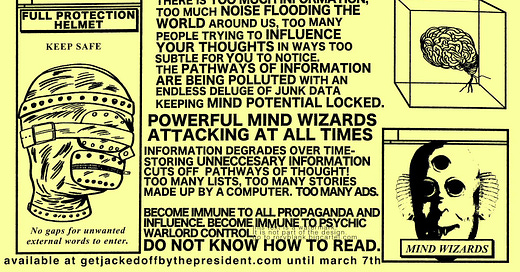I recently posted a video on TikTok about how internalizing a certain popular feminist belief negatively affected my worldview, and my argument was slightly misunderstood by a few people who worried that I was being anti-feminist.1
The video didn’t go viral, I was not a target of dogpiling, and the few critiques I got were mild — but they did force me to further examine my argument and apply it to the broader concept of memetic hygiene. I’m hoping I can better articulate my experience here and receive constructive feedback to further sharpen my argument.
the argument i was trying to make…
In my video, I talk about how regular exposure to the widely held belief that societies devalue women as they age eventually led me to accept it as true. As a result, I started living in fear of the day that it would inevitably happen to me.
I made an off-hand comment that this idea tends to come from feminist literature and philosophy, and a couple of users mistakenly thought I was claiming that feminism, not society, propagates the idea that older women are less valuable than younger ones.2 Of course, I meant that feminists believe people in general, especially men, regard older women with less value. As a result, the argument goes, women face various forms of discrimination as they age. In fact, much of feminist activism seeks to challenge the notion that women become less valuable with age.
Feminist theorists often argue that under patriarchal structures, women are valued for their physical appearance and reproductive viability, both of which are theoretically at their peak in a woman’s youth.3 The idea follows that when women age, they are no longer in their prime reproductive years and are seen to lose their beauty as well. To address this, feminist movements try to highlight the multitude of ways that women are valuable (e.g., skills, intelligence) and might not necessarily conform to stereotypical gender roles (e.g., not all women want to have kids).
The typical examples given to support this claim include the widening wage gap as working women age; the heightened ageism, combined with sexism, that women face in the workplace compared to men; and the lack of representation of older women in Hollywood compared to older men.
The idea that women are devalued as they get older is one that I have heard for as long as I have been on the Internet, and it does not seem to be slowing down anytime soon.
For example, in the video below, popular TikTok user Madeline Aford laments that it is “truly evil how the patriarchy weaponized aging” for women, acknowledging their worth only if they age gracefully. She goes on to declare that “by measuring a woman’s worth by her beauty, and her beauty by her youth, [the patriarchy] essentially ensures that even the most powerful of women will lose that power in time.” Other examples of this rhetoric can be found here, here, here, and here.
 Tiktok failed to load.
Tiktok failed to load.Enable 3rd party cookies or use another browser
If that is in fact true, then what a dismal fate for women! It’s no wonder “anti-aging” cosmetic procedures like botox and fillers are on the rise — especially among younger and younger women — along with various pseudoscientific “anti-aging” products, supplements, and beauty tools.
If we believe this narrative, regardless of how true it might seem, are we worsening our outcomes in terms of mental health and life quality? How does such a belief modify our behaviors to optimize for the things in life that ultimately don’t matter or contribute meaningfully to our lives? I already have friends in their mid- to late-20s who are planning their facelift and “mommy makeover” procedures for their 40s — or completely opting out of parenthood out of fear of ruining their bodies, accelerating the physical signs of aging, or feeling invisible as many mothers claim to feel.
These might seem like silly or even self-absorbed fears on the surface, but if you take a step back and scrutinize the origins of these fears (including the narrative consistently shoved down our throats that women, especially mothers, become less valuable with age), these behaviors and thought-patterns begin to make sense, and you cannot help but empathize.
the midlife crisis: fake news?
Another example that might be more applicable to the wider population is the concept of the midlife crisis. (I frequently hear about the quarter-life crisis as well.)
The midlife crisis has cemented itself in popular culture as inevitable for everyone. Think, for example, of the stereotypical middle-aged man who wakes up one day mortified about how stagnant his life has become, splurges on a motorcycle or sports car with money he might (or might not!) have, and regrettably ruins his marriage by cheating on his wife with a younger woman who does not even care about him. Or the middle-aged woman who… wait, how are female midlife crises depicted? By becoming Karens? Letting out a guttural scream? Anyway, real or not, these tropes have certainly seeped into the collective consciousness, at least in American culture. I’ve even heard this discussed casually in conversations with others who bitterly recount their parents’ midlife crises.
Depictions of the midlife crisis are almost hard to escape; they have become central to many shows, movies, novels, and other media sources. (Hulu’s Fleishman Is In Trouble is the latest one, but for wealthy status-seekers in New York City and their wannabe counterparts in the suburbs of New Jersey.)
But, similarly to the idea that women become less valuable with age, I worry about the effects of accepting the midlife crisis as part of the human condition, as something that happens even to the best of us. What if it’s not as prevalent as we depict it to be? What then? Would people be more likely to experience better midlives if they don’t have such terrifying expectations of it? (Forgive me, for I realize I’m coming dangerously close to being one of those people who lecture everyone about the power of manifestation and how our thoughts shape our lives.)
In a New York Times opinion piece titled “Millennials are hitting middle age — and it doesn’t look like what we were promised”, Jessica Grose shares the experiences of Americans in their 40s, many of which are not great, but she also questions if the midlife crisis was ever real to begin with.
The Times asked its older Millennial readers about their middle-aged experience and received responses that range from hopeful (“I’m entering my Eileen Fisher phase of
life, and it is much more enjoyable to me” and “I keep feeling like my life is about to get started, much like how I felt at 20, even though I’m 40”) to downright depressing (“The words make me shiver and want to run to get some more Botox” and “Physically, yes. Economically, I’m in my 20s” and “I still feel like an imposter whenever I catch myself adulting, even though I’m a father now and an attorney” and “I don’t feel established in life. What I feel is a loss of potential”).
But what were they actually promised in the first place? And is what they are experiencing actually a midlife crisis, or is it life as usual? Grose introduces some studies that have tried to assess the reality of the midlife crisis, and the cliche doesn’t seem to hold up:
Dr. Schmidt has written about how “midlife crisis” for men became “an accepted cultural phrase,” despite the fact that there was not “a scientific, methodologically rigorous discovery” to prove it was a widespread phenomenon. . . . .
Starting in the mid-’90s, researchers finally did rigorous academic work on the midlife crisis and found that it was not a “universal feature of human life” and that only 10 to 20 percent of people experience it. What they found was that there is no universal happiness trajectory that can predict our feelings at any given life stage.
These discoveries came from an ongoing survey called MIDUS, which stands for “Midlife in the United States.” MIDUS research, which began in 1995, has challenged the widespread idea that happiness is a “U-shaped curve” — that well-being is highest when you’re young and old but dips in the middle. Dr. Lachman, who has worked on MIDUS for years, said that while there is some evidence of a “small dip” in happiness at midlife, “there is also longitudinal evidence from MIDUS following the same people over time that suggests the picture is more complex.”
Dr. Lachman also said that some people even see middle age as a high point. “If you ask people to retrospect and reflect, they often see those years as the peak of their life,” she told me. They may be reflecting on the joy they felt when their children were young or about the time before the losses of any typical life begin to add up — when their bodies still worked pretty well, before their friends started to die.
Forgive me if this is too crazy of a thought, but what would happen if we spread the idea that women become more valuable as they age? That one’s middle age is a significant time in their life, filled with both trials and the creation of sweet, meaningful memories that will last a lifetime? Better yet, what if we took a neutral approach, and stopped trying to impose expectations on such personal and non-uniform experiences?
I often wonder if holding these beliefs instead of their more pessimistic counterparts would improve our lives in any way. In fact, I’ve recently decided to try this out and retrain my thought patterns and actions to be more optimistic about my future. (I did something similar with my anxiety and reduced it by a great deal over a couple of years!)
I’ll report back in a couple of decades to let you all know how it’s going for me.
memetic hygiene
Ultimately, however, I am not interested in arguing whether or not women are treated as less valuable as they get older or if the midlife crisis is real. Sure, they are interesting topics and undoubtedly affect me and virtually everyone I know, but we will have to save these long debates for another time. Instead, I want to talk about the risks of accepting certain ideas and outline some steps we can take before internalizing a belief or acting on an idea.
An info-hazard is something that is true but dangerous to know or may lead to harm, such as the instructions to building an atomic weapon; the (very convincing) idea that free will does not exist,4 assuming it is one day definitively supported; or depictions of suicide in media.
But what about ideas that cannot be or are not yet proven true? Memes, coined by Richard Dawkins and defined as an idea, behavior, or style that passes between people or generations within a culture, can be incredibly damaging to individual or collective psyches — and it behooves us to create guidelines that protect us from harmful memes (such as, in my opinion, the midlife crisis or women being devalued with age).
Perhaps we can treat ideas as germs with the potential to infect us. Not all germs are harmful, in fact, some are great and nourishing (e.g., certain fungi and bacteria), but the harmful ones should be taken seriously and treated as dangerous.
Similarly, not all ideas are harmful, some are great and nourishing, but we should protect ourselves and society at large to avoid the contagion of bad ideas and, as a result, the degradation of our culture and collective intelligence and safety. Ideally, we should arm ourselves with the tools necessary to develop some level of immunity to harmful ideas.
Importantly, not all ideas are spread through mere exposure contagion. Two other mechanisms for the spread of ideas include (1) social influence, or adopting ideas that have been adopted and thus “validated” by one’s ingroup, and (2) social learning, or adopting ideas that were initially practiced by others and seem worthy of adoption (e.g., wanting to get a divorce but fearing the social and economic repercussions of doing so; seeing someone close to you get a divorce; and moving forward with the divorce if that person’s outcome wasn’t as bad as expected).
So what should we do about this? Sarah Perry’s article “The Limits of Epistemic Hygiene” makes a case for applying the hygiene model of infectious disease (a set of infection-prevention tools including improvements in nutrition; cleanliness practices; vaccines; and antimicrobial drugs) to ideas.
Idea hygiene includes the following tools as potential responses to dangerous ideas: improvements in education and its intended outcomes (e.g., intelligence, knowledge, critical thinking); various degrees of self- and societal censorship; exposure to dangerous but weak ideas and arguments; and social norms and practices that shun bad ideas.


She covers several considerations we need to make for each part of her proposed idea hygiene; I won’t recount every point she covers for the sake of length, but I highly recommend reading her article not just once, but twice!, to fully understand and appreciate her argument.
The ideas that women lose their value with age and that people experience midlife crises have likely spread through social learning: there seems to be just enough empirical evidence to support the notion that these experiences are real, and adopting these ideas doesn’t seem to harm us, at least on the surface. In fact, discussing these ideas as though they are true might protect us or even boost our social status — we can use these ideas to develop life lessons that make us seem wise; we can use these ideas to analyze societies and human psychology to make us seem smart; and we can use these ideas to criticize culture to make us seem more virtuous.
At the end of the day, we don’t know how true these ideas are, and I don’t think we should treat them as inevitable or highly likely just because we know a few people who have experienced them or have seen social media posts that intellectualize them. Life is messy and unfair, and there are far too many exceptions to both of these rules for me to consider them… rules. We might be better off hearing them and looking for counterexamples to try to prove the opposite.
I’m choosing to preserve my memetic health by making use of the “censorship” tool in Perry’s ideas hygiene model — entertaining these thoughts, but not accepting them as true. My hope is that one day, we will have wide exposure to the weakened forms of these ideas and reject them as silly at best and dangerous at worst, hopefully improving our lives in the process.
I’m interested in hearing about other socially accepted ideas that do not contribute positively to our well-being and fail to be convincing upon scrutiny. Let me know what you think in the comments below.
Thank you for reading!
I’m working on not hedging or caveating everything I say, but I do feel the need to make it clear here that I am not what many would call “anti-feminist” — a term that has been used so irresponsibly on social media that it has become hard to define accurately.
Another thing I’m working on is limiting the use of “society” in my arguments. Bear with me, I’m trying!
At the risk of contradicting myself in the first footnote, I do want to say that I typically get annoyed when people throw around words, like patriarchy, that have become muddled, loaded, politicized, and accepted as facts about reality rather than theories that should welcome critique and further exploration. In my last Substack, I wrote about how interminable debates are often the result of people unknowingly using words in different ways.
Sorry! Don’t hate me for this one.






You've shared so many thoughts that I've been pondering myself as I think it's hit me that I'm on the other side of the youth spectrum and the internet seems to amplify the voices of the young and hot. I found Madeincosmos blog and perspective refreshing. Do read her stuff if you haven't been already - she talks a lot about how essentially older women/mothers won't be respected in society until they accept themselves.
https://open.substack.com/pub/madeincosmos/p/what-is-grandmotherly-wisdom?r=5463l&utm_campaign=post&utm_medium=web
“Letting out a guttural scream” made me laugh!